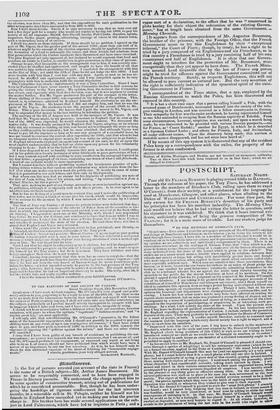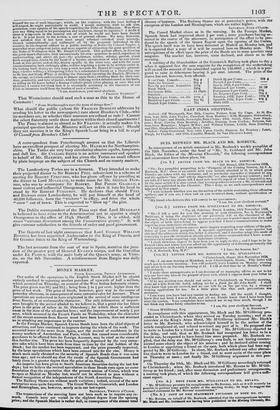POSTSCRIPT.
SATURDAY NIGHT.
FOOr Old Sir FRANCIS BURDETT is playing second fiddle to RAPHAEL. Through the coltunns of his paper, the Tory Times, he has addressed a letter to the members of Brookes's Club, calling upon them to expel O'CONNELL from their society, as a punishment for the language he used at Manchester, Glasgow, and other places, when alluding to the Dukes of WELLINGTON amid CUMBERLAND. For some time past, the only excuse, for Sir FiraNcis Buituerr's desertion of his party and his principles has been his manifest imbecility. The Morning Chro- nicle would not believe that he had written the letter in question, until his signature to it was exhibited. We think that it bears internal evi- dence, sufficiently strong, of being the genuine composition of Sir FRANCIS; for it is a mere mass of twaddle. Let our readers judge for themselves.
" TO TILE MEMBERS OF BROOKES'S CLUB.
"GeIllierneu—Ever since I read the newspaper accounts of Mr. O'Connell's sayings and doings at Manchester and Glasgow, on lias mission (as lie terms his return to Ire. laud through those towns), I have tell. as a member of this Club, that it would be in. cumhent on mis to take them into our serious and dispassionate consideration ; since, in my opinion, we are collectively and Usti% illual:y compromised by thetn. There is an observation somewhere in the writings of Thomas Paine, that " that which is a dis- grace to human nature throws something of a shade over all the human chataeter, and every individual feels his share of the wound which is given to the whole!" This strikes me as a soma' moral tnaxim, forcible when applied to relations between indi- viduals anti society at large, but acting with incalculably greater force, anti fraught with more cogent conviction, when applied to those small select societies called clubs, more especially political ones. When men are admitted into these associations, they become, as it were, bound like our Saxon forefathers in an union or frank pledge mu- tually to one another for good behaviour; voluntarily submitting themselves to the club as to a tritemal whence lies no appeal, the whole body thereby becoming re. sponsible to the public for the decent behaviour at least or as members. On this ground I appeal to the Club for its judgment on the conduct of Mr. Daniel O'Connell, one o' its members. I am taking it for grouted that the newspaper accounts of his exlitbithms of himself at Manchester and Ulasgow are correct ; and I think myself en. titled to entertaiu this opinion, from so long a period having talICC elapsed without any contradiction, apology, or explanation on his part. Thence I infer, that in his own opinion his language and deportment were unexceptionable, gentleman-like, and be. coming. I know nut how other men's minds niay have been affected on reading the reports above-mentioned, but on mine was produced a strong feeling of disgust, not un- accompanied by a sense of humiliation and shame at 'Aug. as a member of the Club, exposed to the imputation of participating, or acquiesciug in, or tolerating, such pro- ceedings. In a word, I felt acutely my share of the wound. Upon the present occa- sion I beg leave to dismiss all political considerations. In his late transaction with Mr. Raphael regarding the representation of Carlow, I exclude entirely the pecuniary features of the ease. These may probably be investigated before the House of Commons. or a court of justice, or both. I confine myself, therefore, entirely to comment upon the manners and the language which every decent society has a right to expect, and a duty to exact from its members.
" Impressed with this view of the case, I beg leave to submit to the members of Brookes's, whether or sin the style and tone adopted by Mr. Daniel O'Connell towards Mr. Raphael (both Iwing members of this Club) is such as we are willing to have
introduced amongst us—such as we could ever be brought to sanction or to endure? Is it even couched in such terms as one member of a civilized community ought to be
permitted to apply to another ? "lii his fecund letter to Mn, Raphael, Mr. Daniel O'Connell is pleased (I should con-
ceive through a species of misgiving) to call his outrageous expression (a 'Lich he had on a former occasion applied to the Duke of Cumberland) " the usual Irish phrase." With Mr. Daniel O'Connell himself this may be (and too apparently is) a very usual phrase, but I cannot believe that it is a usual phrase with any one else in Ireland. I once had au opportunity of seeing a great deal of that country, passing several months there, mixing with classes of every degree. I went much among the peasantry, about whose character I had considerable curiosity, takiug much interest in thou. I wit. nessed and Milled in their various amusements in their most unguarded hours, being accompanital by persons whose presence dispelled all suspiciuu. I was forcibly struck by the absence of any thing gross or offensive among them. On the contraty, thew natural politeness was SUCII US to place at his ease any man accustomed to the best society. The object of their natural and inost decided aversiou seemed to be a klafit• guard ; the precise epithet which they were in time habit of applyio6 whenever their in- dignation was excited, or whenever they wished to give vent to their reproach. What Mr. Daniel O'Connell is pleased to style time" usual led it phrase." I scarcely ever heard ; an 1 I cannot help thinking that any man in Ireland, in whose mouth It was familiar, would be very abort-lived, at least were he wining to abide the usual consequence of indulging in it. In that case, Mr. Daniel O'Connell himself wonkl not be so old as he is by a fortnight. He has placed himself la a state of impunity. exalted or degraded, as men may happen to regard it. At all events, however, be stands in the predicanieut of being 1.120 last man in the wolld who ought to allow laimself the use of such language; a hich, on the contrary. with the least feeling of self-respeetAte ought particularly to avoid. I would, moreover, wish to ask you. gentlemen. your opinion of his speech respecting the Duke of Wellington. Was there ever any thing equal to its presumption and insolence, except its injustice? I doubt if there is a taasmom in the country out of which he would not have been turned for it. It is-an insult to the nntion, a sort of general offence. We may, however. rest satisfied that it has been most amply rebuked-rebuked most severely, though unintentionally and uuthought of, by the primmest individual in the country, in his eloquent address to a public meeting at liath-by Colonel Napier, a somewhat mom competent judge, and more capable of estimating the great qualities of the Duke of Wellington than Mr. Daniel O'Connell. This gallant officer, in drawing the great man's character. drew unconsciously his own-generous in mind, rapacious in understanding. and, above all, just-the gentleman, soldier, scholar, patriot, stand forth conspicuous, drawn by the hand of a master. unconscious of what he was about. Look at this picture and on this, drawn equally in the same way, and w ith the same unconsciousness. both strikingly alike, neither requiring a name to be written under it. On looking back. (liable no very Mug wriod, towards Mr. Daniel O'Connell's proceed- ings. w halter writing a whimpering letter to a calumniated friend, or a blustering one to the base mid bloody Whigs, or reviling the Sassertagh (meaning the English. Hibernia, the enemy). or (when endeavouring to impose upon them) extolling them for their can- dour, generosity, and love of justice, whether bullying w it h a deluded crowd at his heels, or falling on his knees before a Roman Catholic priest (thus playing at once idol and idolater), 1 (menet but think that it is absolutely necessary to the character of our Club to exonerate itself from the burden of such a member.
" I am, Gentlemen, your most obedient,
" FRANCIS BURDETT."
That Westminster should send such a man as this to the House of Commons !
"From Marlborough's eyes the tears of dotage flow."
What should the public (whom Sir FRANCES BURDETT addresses by sending his letter to the newspapers) care about Brookes's Club—who its members are, or whether their manners are refined or rude ? Cannot the select fraternity settle these matters within their closed apartments ?
The Times is almost as absurd as Sir Faexcis it actually makes it a principal question how the Ministers will act on this occasion ! Should they not mention it in the King's Speech ?—or bring in a bill to expel
Connellfroni Brookes's Club



























 Previous page
Previous page